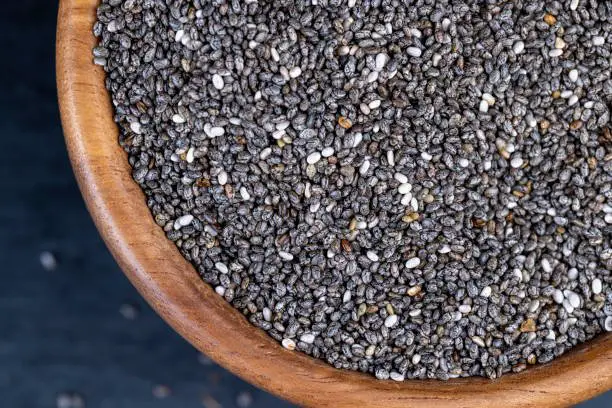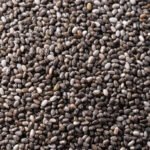Chia seeds and oil are considered superfoods. Both appreciate different well-being benefits because of their omega-3 unsaturated fat content. Notwithstanding, picking the seed and its oil companion might be annoying because each has different dietary advantages and purposes.
Chia seeds are little, however nutritious. These Mexican seeds, a staple in Mayan and Aztec diets, are respected for their sustainable energy. The ancient Mayans called “chia” “strength.” These seeds have abundant omega-3 unsaturated fats, fiber, protein, calcium, antioxidants, and magnesium.
Chia seeds are notable considering they are versatile to different cooking styles. Sprinkle them all over plates of leafy greens, mix them into smoothies, or add them to yogurt and porridge. In light of their soluble fiber, they make a gel when mixed in with water, spreading the word about them a well veggie lover egg alternative in baking. This soluble fiber helps stool production and regularity. Chia seeds similarly contain prebiotic fiber, taking care of stomach-friendly bacteria and supporting stomach health.
Chia oil, obtained from these strong seeds, is known for its omega-3 unsaturated fats. Dissimilar to seeds, oil is without fiber and high in alpha-linolenic acid. It is a fantastic method for increasing omega-3 unsaturated fat without fiber. The nutty chia oil makes it a fantastic salad and cold dish dressing. For its tricky nourishing profile, it should not be fried because high temperatures denature unsaturated fats, making them less critical and conceivably risky.
Health goals may determine the dietary decision between chia seeds and oil. Chia seeds are excellent for digestive health and weight management by promoting fullness. Their high fiber content satisfies and delays digestion, preventing post-meal blood sugar rises. Diabetes patients benefit from this.
Chia oil may be better for people who want to concentrate on omega-3 fatty acids without the carbs or calories of seeds. This makes chia oil a good supplement for ketogenic dieters or people with gastrointestinal disorders that require fiber restriction.
Chia seeds and oil incorporate ALA, which the body can convert into EPA and DHA. For cardiovascular wellbeing, greasy fish and algal oils are great wellsprings of EPA and DHA because these changes are wasteful in people. However, veggie lovers and plant-based eaters can obtain this imperative part from chia seeds and oil.

Another advantage of chia seeds over oil is their antioxidant profile. These antioxidants prevent rancidity in seed lipids and provide health advantages. They reduce oxidative stress associated with heart disease, cancer, and premature aging.
Cooking requires knowledge of fat smoke points, and chia oil is problematic. Due to its low smoke point, cooking at high heat is not recommended. It’s a healthy recipe addition but should be utilized carefully to retain its fatty acid profile.
Personal health goals, diet, and culinary needs determine chia seed or oil use. Chia seeds may benefit those seeking digestive health or multifunctionality. Chia oil may be a good choice for omega-3 fatty acid enthusiasts due to its rich form.
Each product has health benefits, making them useful in a health-conscious kitchen. Whether they use the crunchy seeds or the silky oil, people are adding one of nature’s most potent superfoods to their diets. As the argument between chia seeds and oil continues, the answer should depend on individual health demands and culinary applications to make each person’s wellness journey as effective as possible.
Chia Oil: A Potent Omega-3 Source for Enhancing Heart Health
Chia oil sparkles in the huge dietary scene that upholds cardiovascular wellbeing. This oil, produced using the chia seed (Salvia Hispanica), is a vital wellspring of omega-3 unsaturated fats, which forestall coronary illness. Chia oil works just yet immensely affects human wellbeing, notwithstanding the intricacy and clashing suggestions around heart wellbeing.
Antiquated Aztecs and Mayans depended on chia seeds for their healthful characteristics. Rediscovering chia seeds as a superfood has expanded their ubiquity in diet and health circles. These seeds make an oil high in alpha-linolenic corrosive (ALA), an omega-3 unsaturated fat the body can’t make when cold-squeezed. Chia oil is a decent source since it should be eaten.
The cardiovascular benefits of omega-3s are notable. These limit fundamental irritation, a significant gamble factor for cardiovascular infection. Omega-3s diminish fatty oils, which raise coronary illness risk. These unsaturated fats likewise lower circulatory strain, coagulation, stroke, and cardiovascular breakdown risk.
Chia oil stands apart among omega-3 sources because of its high omega-3 to omega-6 proportion. Omega-6 unsaturated fats, predominant in handled dinners and vegetable oils, can irritate overabundance. Chia oil has a superior omega-3 to omega-6 proportion than flaxseed and fish oil, which might contain impurities and weighty metals.

We look at chia oil’s lipid profile to comprehend its heart-medical advantages. The oil further develops plasma lipids by bringing down LDL and raising HDL. It is called’ terrible’ cholesterol because LDL cholesterol has a propensity to make plaque in the veins and cause blockages and cardiovascular failures. HDL (‘great’ cholesterol) eliminates cholesterol from the corridors. Chia oil raises HDL levels and makes LDL particles bigger and lighter, which is better for the heart.
Chia oil is easy to incorporate into the diet. It can be added to smoothies, yogurt, and salads. Its mild, nutty flavor makes it flexible in recipes. Chia oil should not be cooked at high heat to preserve its fatty acids.
Chia oil aids various health areas besides heart health. The seeds ‘ anti-inflammatory and antioxidant qualities, cognitive function, and fiber content help improve skin, gut flora, and health.
Chia oil’s heart benefits are yet to be considered. Recent investigations indicate that it might further develop insulin responsiveness and diminish corpulence, both risk factors for coronary illness. Chia oil has become an all-encompassing prosperity supplement and a heart wellness supplement.
Similarly, as with any enhancement, chia oil should be taken respectably. For individuals with previous wellbeing concerns or who are pregnant, see a specialist before adding this oil to their standard daily schedule.
When diets are increasingly viewed as clinical and remedial, chia oil is a firm heart-well-being supporter. Its utilization shows the capacity of regular mixtures to save and work on human wellbeing, which has been known for centuries yet is currently being completely appreciated in logical and clinical terms. Chia oil fortifies the heart and body against infection by conveying adjusted fundamental fats.






Leave a Reply